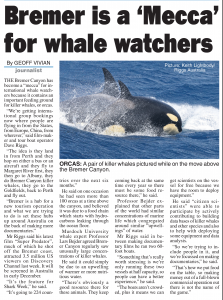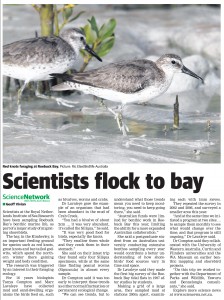GEOFF VIVIAN
The Bremer Canyon has become a “mecca” for international whale watchers because it contains an important feeding ground for killer whales, or orcas.
“We’re getting international group bookings now where people are flying in from the States, from Europe, China, from wherever,” said film-maker and tour boat operator Dave Riggs.
[From The Great Southern Weekender, July 16, 2015, p7.]
The story goes on to talk about his new doco on Discovery Channel.
In our interview he made an assertion about a scientific matter and, as neither he nor I are scientists, I ran it past a prominent cetacean researcher that I know.
That is all a journlist needs to do when presented with a matter of “science” that is not in a reputable peer-reviewed journal – get an expert opinion.


